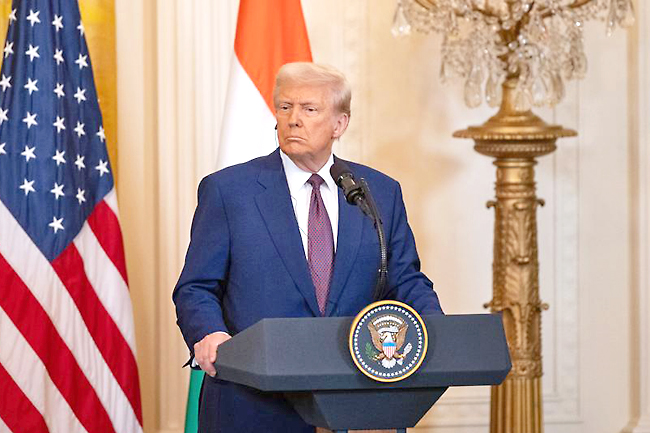BEIJING (XINHUA) – United States (US) President Donald Trump’s plan to impose reciprocal tariffs on all trading partners has drawn wide concerns that it could trigger a trade war and dim the global economic outlook.
Trump signed a memorandum directing his administration to determine “the equivalent of a reciprocal tariff with respect to each foreign trading partner”, a decision he justified as “for purposes of fairness”.
However, the Associated Press (AP) said in a report that “Trump is taking a blowtorch to the rules that have governed world trade for decades”, and the “reciprocal” tariffs “are likely to create chaos for global businesses and conflict with America’s allies and adversaries alike”.
According to non-resident senior fellow at the Peterson Institute for International Economics Gary Clyde Hufbauer, under World Trade Organization negotiations, “reciprocity” meant overall balance, in terms of concessions given and concessions received, between each country on the one hand and all its trading partners on the other hand, but Trump has redefined the meaning of “reciprocity” to apply on a line item basis, country by country, rather than overall balance.
“With reciprocity, as defined by Trump, US tariffs would be probably on average 10 to 15 percentage points higher. In my opinion, tariffs actually hurt the US economy, so while they would raise revenue … they would reduce gross domestic product (GDP) growth,” Hufbauer told Xinhua.

“Obviously, it disrupts the way that things have been done for a very long time,” said a trade attorney at Miller & Chevalier Richard Mojica in the AP report. “Trump is throwing that out the window… Clearly this is ripping up trade. There are going to have to be adjustments all over the place,” he said.
President and CEO of the American Apparel & Footwear Association Stephen Lamar described the situation as “a very, very chaotic environment”. “It’s hard to plan in any sort of long-term, sustainable way,” he said, quoted by AP.
The National Retail Federation (NRF), which represents the US retail sector, has warned that the massive scale of undertaking “will be extremely disruptive to our supply chains.”
“It will likely result in higher prices for hardworking American families and will erode household spending power,” NRF executive vice president of government relations David French said in a press release.
French said the University of Michigan’s monthly consumer sentiment index continues to decline, suggesting consumers are alarmed about trade war uncertainty.
“We encourage the president to seek coordination and collaboration with our trading partners and bring stability to our supply chains and family budgets,” he added.
Calling the reciprocal trade policy a step in the wrong direction, the European Union (EU) said the newly imposed tariffs will hurt the US economy by raising the price of final products consumed by the American people. “Tariffs are taxes,” said the European Commission. “By imposing tariffs, the US is taxing its own citizens, raising costs for business, stifling growth and fueling inflation. Tariffs heighten economic uncertainty and disrupt the efficiency and integration of global markets.”
Besides the increased tax burden, which is typically passed on from importers to consumers, economists have also warned of the severe consequences for the global economy.
“Our analyses suggest that the main impact will be on growth,” said European Central Bank Vice-President Luis de Guindos. “If the world embarks on the path towards a trade war, this will have an extremely negative impact on the growth prospects of the global economy,” he told Xinhua in an interview.
“Increases in tariffs and quotas are a negative supply shock, especially if accompanied by retaliation. This vicious circle should be avoided,” he said.
General manager of the Lower Saxony Business Associations Benedikt Hueppe described the tariffs as “poison”, especially for the export-oriented economy in Germany.
Tariffs would also slow down the ability to innovate, Hueppe said, adding that trade wars make products more expensive and thus would drive up inflation.
The reciprocal tariffs are the latest in a series of tariff measures announced by Trump recently.


